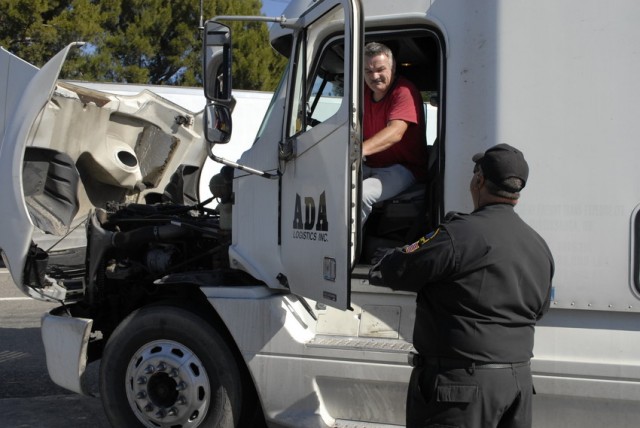With trucks a major source of particulate air pollution, officials with the California Air Resources Board counter that they’re duty bound to do all they can to clean up particulate air pollution.
These new standards are already making a difference. In early 2010, the Port of Oakland instituted a program to replace and retrofit some vehicles. Just a few months later, researchers at UC Berkeley reported that some pollutants dropped by 40-50 percent.
Now with the next phase of requirements coming for soot filters and other pollution controls, Air Resources Board inspection crews are checking trucks throughout the state.
Recently, field enforcement supervisor Ching Yang’s team set up at a weighing station north of Los Angeles. Yang motioned a truck emblazoned with the stars and stripes to pull over. Then he called to the driver to rev the engine.
Moments later, Yang had the hood open. He started spotting problems right away. Memphis-based driver Mike Cooper’s rig didn’t have a factory-issued sticker showing his engine is the right model for his truck. That meant an $800 fix-it ticket. Even worse, Cooper didn’t know his 1999 rig is supposed to have a particulate filter costing as much as $20,000. That’s almost what another used truck would cost him.
The median pay for self-employed truck drivers like Cooper is about $40,000. He said there’s no way he can afford a filter. But if he wants to keep doing business in California, he’ll have to get one in the next two months.
Standing a few yards from Cooper’s truck, Air Resources spokeswoman Karen Caesar said her agency has distributed flyers, set up web sites and run training sessions for truckers. She says regulators understand the economy has been weak; they’ve extended deadlines and raised extra money to help the truckers comply with the rules. But Caesar notes that 43 percent of California’s diesel particulate pollution comes from trucks. And the bottom line is, the Air Board is under orders to safeguard public health.
“You’ve probably driven down the freeway at some point in your life behind some truck that’s just spewing all this toxic stuff, and you wonder ‘Why doesn’t somebody do something about that?’” she said. “And you know, that’s what we’re doing.”
As of Jan. 1st, trucks built after 1995 must have state-approved filters that intercept soot and toxic metals. Owners of three or fewer trucks must make a good faith effort to install their first filter on time. Then they have up to three years to get filters on the rest. Violators face fines of up to $10,000. Trucks built in 1995 or before get out of the filter requirement, but they have to upgrade their engines to a clean-burning 2010 model or better over the next two years.
“If we can clean up these fleets, then we will definitely have a positive impact on public health,” Caesar said. “We’re talking about everybody -- but especially the sensitive populations, which are generally children, and elderly and people with impaired immune systems.”
Joe Rajkovacz, government affairs director at the California Construction Trucking Assn., said regulators should take the still-impaired economy more into account.
“There is a crisis in transportation,” he said. “If they enforce their rules from the first of the year, there’s a very good chance that 40 percent to 50 percent of the trucks that operate in this state are not in compliance. You’re talking construction coming to a halt, goods movement coming to a halt. Agriculture’s the goose that lays the golden eggs in this state. And they’re facing the same rules.”
To help the truckers out, the state has distributed nearly $340 million in grants to pay for newer vehicles, up to $50,000 per truck. State-sponsored loans have provided another $200 million.
Sieb Bangma, whose two trucks haul sulfuric acid for Los Angeles oil refineries, got a grant. In exchange for junking his 1998 truck, he received a $15,000 check toward the purchase of a much newer rig. That fell well short of the new truck’s $50,000 price tag, because the subsidy was limited by Bangma’s low annual mileage. Nevertheless, he’s happy with the deal.
“It was probably about three, four months for us to get the whole thing going. I’m glad to get it over with and don’t have to worry about it for a couple years, and then we’ll see where it goes,” he said.
Monte Eberhardt is measuring his future in months. He just found out at a roadside inspection that he’s going to need a $17,000 filter for his 1998 truck by Jan. 1. Eberhardt thought he had more time to get one, and he says he had been working on it well before he got pulled over.
Eberhardt thinks he could afford the monthly payment, if he could just get a little more time. He says he’s called the Air Board over and over.
“If they’re gonna stand there and make me feel like I’m doing something wrong, trying to feed my family, on the side of the road, like I’m breaking the law, at least when I call to see if I can get some kind of financial aid or help, answer the damn phone.”
The air board’s Karen Caesar says they’ve been getting about 2,000 calls a week, four times the number received this time last year. Caesar says they’ve installed a better phone system and put more people on the line, and they’re returning calls as fast as they can.
